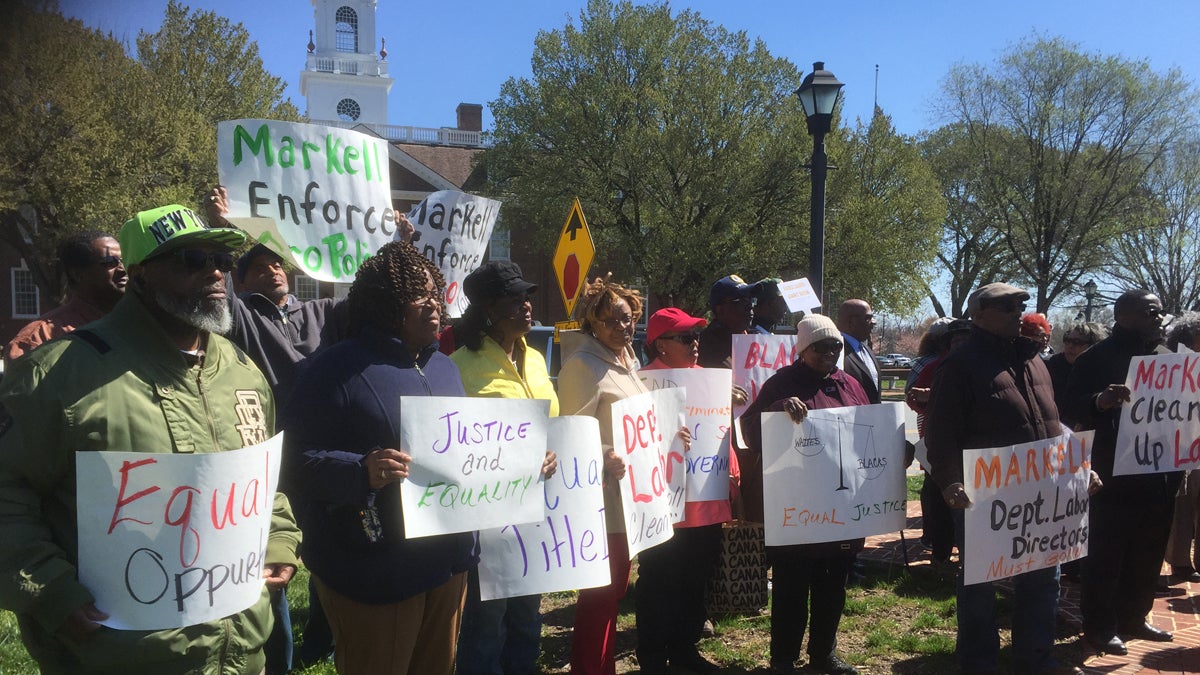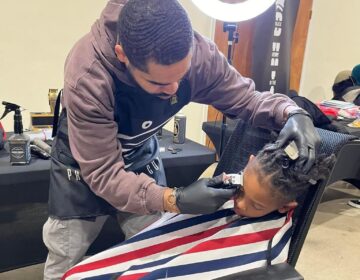Civil rights, religious leaders call on Gov. Markell to address workplace discrimination

Civil rights and religious leaders
A coalition of civil rights and religious leaders say Gov. Jack Markell, D-Delaware, is not taking enough action to address allegations of workplace discrimination and racism in Delaware’s state agencies.
The DE Faith in Action Coalition met with Delaware residents outside Legislative Hall in Dover Tuesday to demonstrate against what they believe is complacency in the governor’s office.
“There’s a crime of omission when silence is the response from the cry of people who have been in pain and have been wronged,” said the Rev. Vincent Oliver, a member of the Interdenominational Ministers Action Council and pastor of New Calvary Baptist Church in Wilmington.
“We’re here today because the governor needs to open his mouth and say something tangible about how he feels. A nod of his head is not enough.”
The group of religious and civil rights leaders formed after a group known as the Committee on Racism in State Government released a report on discrimination and racism in state agencies.
The committee was made up of members from IMAC, the Interdenominational Ministerial Alliance of Dover & Vicinity, the Interdenominational Faith Coalition of Sussex County and the NAACP.
This is the second demonstration the larger coalition has held. At the end of February, it hosted a demonstration in Wilmington after it said the governor didn’t respond to its request for the removal of Department of Labor management employees who allegedly violated anti-discrimination laws.
Markell didn’t respond directly to Tuesday’s demonstration, but his office released a letter written to the coalition following February’s demonstration, which assures the group that the governor is committed to ensuring a healthy work environment to state employees.
The letter states the governor has opened communication between state workers, the coalition and the state, and has set up a hotline protocol to receive complaints.
The office also is working to hire a consultant to assess human resources practices. There also are plans underway to review protections available to whistleblowers, and to put in place an anti-discrimination policy.
The coalition has said it released specific names to the governor of managers who allegedly violated anti-discrimination laws. However, the governor’s letter said the coalition has not provided enough evidence of wrongdoing on the part of specific employees, and it cannot legally release information about individual personnel actions.
After interviewing more than 100 state employees the committee released a report early January alleging racism and discrimination, and claiming workers feared retaliation if they reported a hostile work environment.
According to the report, the greatest complaints came from Department of Labor workers, and participants were most fearful of retaliation in Kent and Sussex counties, where the report says blatant racism was more common.
Following the publication of its report, the committee released it to the governor and had a follow-up meeting with his office. The members say they have discussed the work involved in undertaking a statewide assessment.
The coalition has asked the governor to create a civil rights commission to do its own studies without government interference, a review of Delaware’s labor law, a review of whistle blower protection and accountability for the secretaries of state agencies.
On Tuesday, the coalition said even though Markell’s administration is working on several of its recommendations, the governor hasn’t discussed a plan or provided a response for holding state personnel accountable for their actions, and for enforcing the state’s anti-discrimination law.
While there’s a zero tolerance policy for workplace discrimination and racism, the group said it isn’t enforced — which means workers’ complaints fall under the radar.
“We’re speaking of a zero-tolerance policy that is to date simply rhetoric,” Oliver said. “There’s nothing in writing. Therefore the policy has no teeth.”
Following the initial report, Markell asked Amy Bonner, the deputy director of Human Resource Management, to review policies, practices and procedures within the Department of Labor. According to the coalition, she found the department to be an “unhealthy work environment due to lack of professionalism and cultural insensitivity.”
She provided several recommendations to John McMahon, the then secretary of the Department of Labor, including creating an internal complaint process, improving communication and professionalism, creating an HR policy that proactively addresses issues and producing a mandatory training curriculum for new employees and supervisors.
In January, McMahon announced his retirement after working in his position seven years, saying, “This job demands a tremendous commitment and I feel it is necessary to step down to have more time to spend with my family.”
Upon the announcement, Markell said McMahon “played a vital role in helping our state tap into the talents of groups who were too often unable to access the employment opportunities they deserved, from recently returning veterans to people with disabilities.”
Dr. Patrice Gilliam-Johnson replaced McMahon in the position. The Department of Labor said Gilliam-Johnson already has made progress since her hiring.
An extranet is available that communicates announcements, new hires and other information. The Director of Administration also is personally interviewing individual complaints as they occur and is recommending appropriate action.
The department also has hired a training specialist and it is designing and offering mandatory courses on topics like respect in the workplace and discipline and grievances.
In addition, Gilliam-Johnson is working on several agenda items, including a revised code of conduct, new recruitment, interviewing and hiring procedures, and the reinstatement of diversity, strategic mentoring and moral committees.
Coalition members say they would like to see new leadership and more departmental initiatives taking place to address the issues. So far, the work being done is solely within the Department of Labor, they say.
“This is something that has been going on for quite some time,” said Jane Hovington, president of the Sussex County branch of the NAACP.
“It is now time for Gov. Markell and our legislators to stand up and insist and ensure that those employees working for the state of Delaware are guaranteed protection under law that their rights are not violated.”
In a response to the group’s concerns, Senate Majority Whip Margaret Rose Henry, D-Wilmington, issued a statement, saying;
“In February, when the General Assembly and Governor took the important step of apologizing for Delaware’s role in perpetuating slavery, our message was undeniable: we must continue to work together to heal the racial divide the specter of that heinous practice has left in its wake.”
However, she said more needs to be achieved to reduce institutional racism.
“When we have this many people who genuinely feel aggrieved, it is a clear signal that we must do more of the hard work required to make inclusion, respect and equal opportunity paramount in all we do as a state and as a society,” Henry said.
State Sen. Colin Bonini, R-Dover, said he believes the coalition’s concerns are legitimate, and that many areas of state government have an “unhealthy culture.”
He said he receives many complaints from people of all genders and races who feel intimidated by their supervisors. Bonini said he would like to work on bipartisan legislation to put together a commission that would investigate the issue.
“I do know many people in our state government work in a poisoning culture and we have to look at that,” he said.
“I’m happy to work with democratic colleagues interested in doing that. I think this is a very healthy discussion to have, and I absolutely think that a lot of what is being said is in fact happening.”
Alicia Clark, a consultant for IMAC, said the coalition is still receiving phone calls from state workers who say they’ve been victims of workplace discrimination and racism. However, these individuals still won’t come forward out of fear of retaliation.
The coalition also has reached out to the U.S. Department of Justice to address the issue in Delaware.
“We are demanding accountability and we are looking for people to be made whole who have been harmed,” Clark said.
WHYY is your source for fact-based, in-depth journalism and information. As a nonprofit organization, we rely on financial support from readers like you. Please give today.





